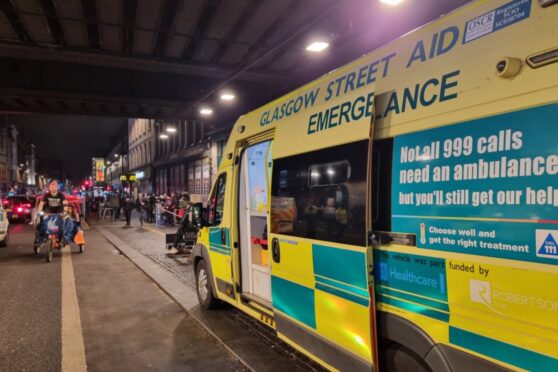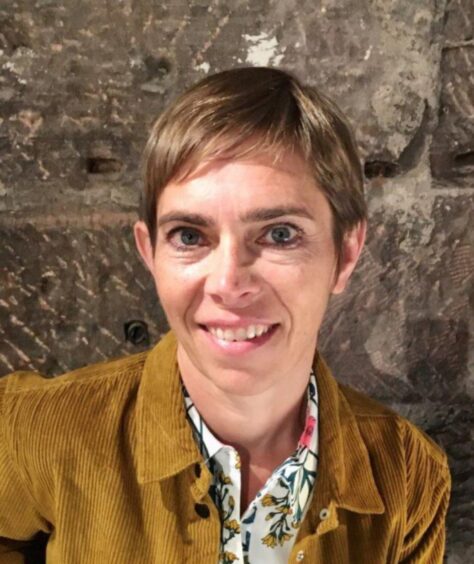
Vulnerable children as young as 12 suffering from the effects of alcohol and drugs are being rescued from city centres by street medics.
The children, ill from alcohol and drugs, are being transferred to the Royal Hospital for Children by the Glasgow Street Aid (GSA) team, originally set up to help adult homeless.
The GSA team of nurses and paramedics offers crucial pre-hospital medical and welfare support in Glasgow every weekend.
Risks on the streets
Street medic Daniel Doyle said: “Some of these young people then have Child Protection Orders placed on them when their parents are not able, for whatever reason, to collect them.
“It’s also not uncommon to attend to vulnerable young children whose parents are unfit by drink or drugs wheeling them about the town in pushchairs.”
The children’s plight comes as the number of Child Protection Orders (CPOs) is rising in Scotland.
CPOs are placed on children when police, social work or health professionals fear that children may have been abused or are at risk of significant harm.
Doyle, a paediatric cardiology nurse at the Royal Hospital for Children, said: “We have young vulnerable teenagers who need immediate care because they are at risk from abuse from older adults who buy them vodka.
“The risk to them is not only the impact of alcohol on children’s bodies but their welfare and vulnerability on the streets.
“We contact their parents and, while some can collect their children, others are intoxicated and unable to do so. Some others refuse to come and assist their children.”
The education and mentorship lead at GSA added that the children come from the city and outlying areas.
The medical rescue service is based near Glasgow Central Station.
Scottish Government statistics now reveal that over a third of 13-year-olds have drunk alcohol and half have been intoxicated from drink given to them by relatives or friends in their own home.
The reports of children in distress and at risk on our streets comes as the numbers of young people on Scotland’s Child Protection Register is rising.
The Scottish Government’s most recent Social Work statistics show that this rise comes after a fall between 2013 levels until 2022. CPOs are now back to 2000 levels.
Notable rises are seen in Aberdeen and Aberdeenshire, Highland, Inverclyde, Borders and West Dunbartonshire.
Liver disease is a leading cause of premature deaths in Scotland, above breast cancer and suicide. Liver deaths in Scotland increased by 85% in the past three decades says a report in Hansard in April.
A petition in the Scottish Parliament is calling for a legal ban on children drinking at home, which is legal from the age of five. It calls for a change in the law to prevent children aged five to 17 from drinking alcohol in their home or other private premises.
The law currently allows this in Scotland and the rest of the UK.
Alcohol Focus Scotland believes that warnings about the risks of cancer, trauma and other serious consequences of alcohol are more effective.
It cites research by the World Health Organisation that suggests people respond to warnings on products about potential risks.
Its report reads: “In 2024, only 13 out of the 53 member states of the WHO European Region had mandatory health warnings on alcohol labels, which inform consumers about various risks associated with alcohol consumption.”
‘They see alcohol as a way of escaping… but it puts them at greater risk’
Alison Douglas, CEO of Alcohol Focus Scotland, said that most children get alcohol at home and not from local shops or licensed grocers.
She said: “The risk to the health and wellbeing of these children is high, not only because they are more likely to be injured in accidents, but they are vulnerable to exploitation and to becoming victims of crime.
“We have to ask why they end up in the city centre, far from their own communities. There are examples of adults using alcohol to groom and exploit children.
“There is no way that children of this age should be able to buy alcohol. If shops are selling to children, or adults are buying for them, this needs to be dealt with as a matter of urgency by Glasgow City licensing board and the police.”
She added that there were likely to be reasons for these children drinking and suggested trauma in their home lives or mental health issues. “They see alcohol as a way of escaping when it, in fact, puts them at greater risk,” she said.
“Feedback from the Children’s Parliament in Scotland shows that some are affected when their parents and carers drink and life becomes more unpredictable.
“A number of parents believe introducing alcohol to children in a safe and controlled way in the home is better, but the earlier children start to drink the more likely they are to develop alcohol problems.”
She calls for more information to help parents understand the risks of alcohol and the effect on the message to children.
“Who would give alcohol to their child if every bottle and can carried a health warning saying alcohol causes cancer? Children’s brains are still developing until around 25 and consumption of alcohol can interfere with this.”
The Scottish Government said: “We continue to take steps to reduce the harm that using alcohol causes to girls, boys and young people. These include substance-use education work in schools through Curriculum for Excellence, investing £1.5 million in Planet Youth, an evidence-based model for substance use prevention, and nearly £4m to expand the successful Routes model which supports young people affected by substance use.
“We are also raising the minimum unit price of alcohol to 65p per unit from September 30, to reduce alcohol harm.”

Enjoy the convenience of having The Sunday Post delivered as a digital ePaper straight to your smartphone, tablet or computer.
Subscribe for only £5.49 a month and enjoy all the benefits of the printed paper as a digital replica.
Subscribe